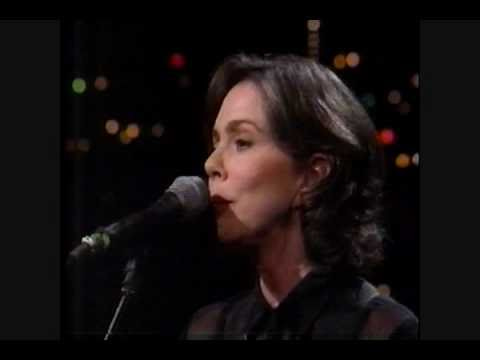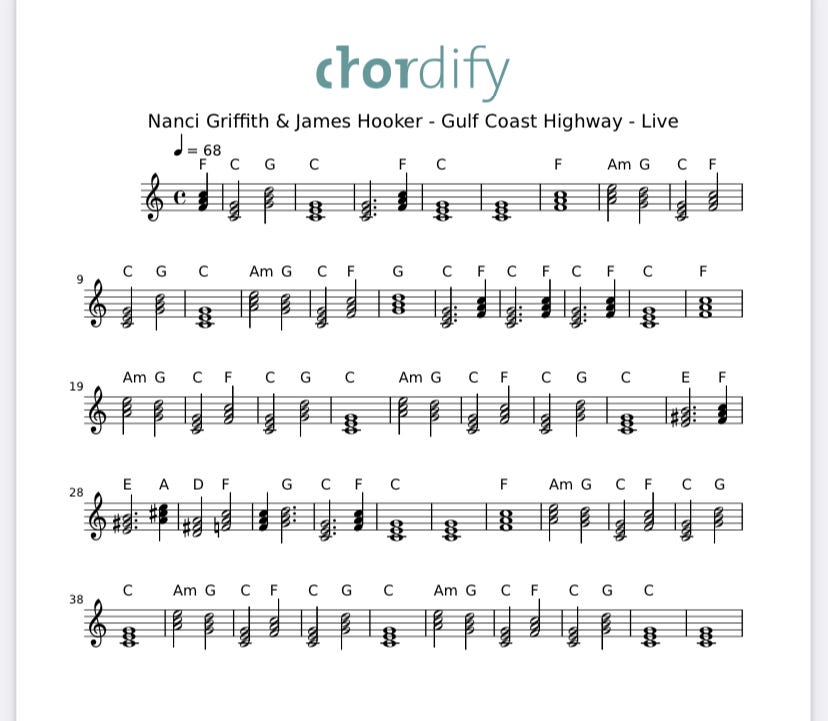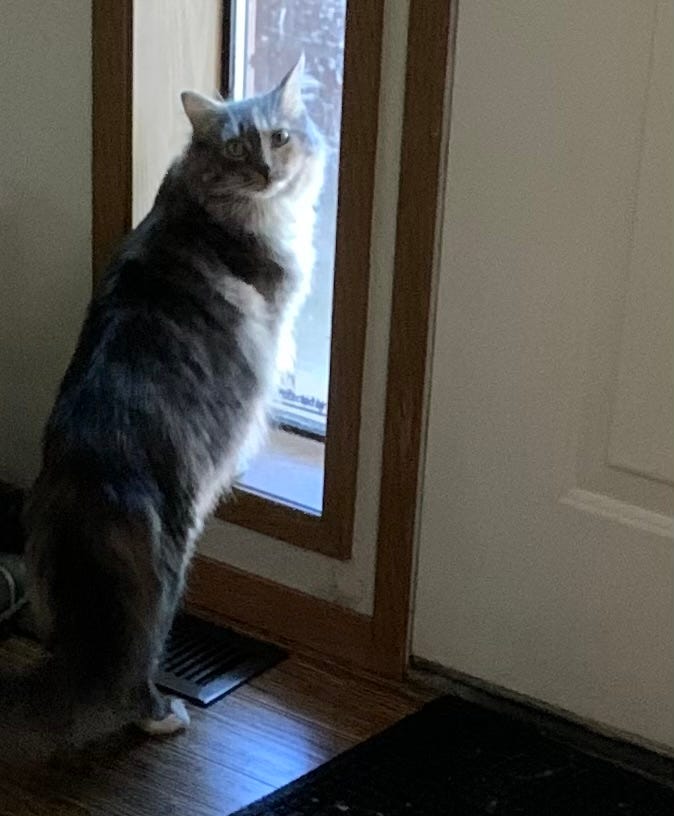Last Week’s Bonus Round: “Gulf Coast Highway” is a song written as a duet by Daniel W. Flowers, James Hooker, and Nanci Griffith. It appears on Nanci Griffith’s 1997 album “Blue Roses From The Moons”.
From Wikipedia: “Nanci Caroline Griffith (July 6, 1953 – August 13, 2021) was an American singer, guitarist, and songwriter.[1] She appeared many times on the PBS music program Austin City Limits starting in 1985 (season 10). In 1994 she won a Grammy Award for the album Other Voices, Other Rooms.[2]
Griffith toured with various other artists, including Buddy Holly's band, the Crickets; John Prine; Iris DeMent; Suzy Bogguss; Judy Collins and The Everly Brothers.[3] Griffith recorded duets with many artists, among them Emmylou Harris, Mary Black, John Prine, Don McLean, Jimmy Buffett, Dolores Keane, Willie Nelson, Adam Duritz (singer of Counting Crows), the Chieftains, John Stewart; and Darius Rucker (lead singer of Hootie & the Blowfish). Griffith had a backing band which she referred to as the Blue Moon Orchestra.” Credit: Wikipedia Link: Nanci Griffith
4/4 (common) time, Key of CMaj, slow ballad time of 68 BPM. Note the single beat “pickup” FMaj chord just prior to the first measure. Four open chords, easy to play - find the lyrics on Genius (Link: Genius (lyrics)) and a friend to sing the duet parts with and have fun with a great song!
Disclaimer: This Substack is free, always will be, and I receive no compensation or other benefit (except the unsolicited, occasional, and much appreciated shoutout from readers and other Substackers!) from any of the people or companies or products I link to or write about. Note some images and other material may be copyrighted by the original author or composer and appear here under the “Fair Use” doctrine. Link: Fair Use Note also I do not use any form of artificial intelligence in writing Michael Acoustic. It is possible that some external sources that I link to or quote, do use or contain AI generated material.
Michael Acoustic
Thanks new subscribers! Mika, the Cat, welcomes you!!
This Week’s Conversation With Mika:
Mika: Old man, on the other side of this invisible barrier that has my nose prints all over it, there’s a squirrel teasing me. Kill it!
Me: No
Mika: Then let me!
Me: No
Mika: (muttering)…useless human…
Last week in Part 3 of the “What It Is, What It Was” series (see this link for posts: Archive) we finished up with “Long Road Back”, having looked at the inspiration, writing process, recording my tracks, delivering them via thumb drive to the guitarist and drummer (Mellad and Kenny) for overdubbing, and the final mixing/mastering of the song at J Bones studio, and a bit about the process of signing up and delivering the final mix to the distributor and publishing admin I chose (CD Baby/CD Baby Pro). There was one other part of the process I hinted at that I’d like to discuss today.
I subscribe to American Songwriter Magazine and one of the perks of membership there is the offer of “Lyric Reviews” which entails sending lyrics for critique to their evaluation team. I did that in 2020 and received back a critique from “Evaluator #01”, who I believe was Mr. Dean Fields. Mr. Fields is a songwriter himself, and a Mentor at American Songwriter (Bio link). I had a messaging conversation with Mr. Fields yesterday about my plan to include the critique in today’s post. He was very encouraging and asked if he could include my comments as a testimonial about the lyric reviews his team offer. Of course I said yes!
So, below is the result of the critique from a couple of years ago. I didn’t include the whole thing because other than the comments below it mostly just consisted of the lyrics we’ve already discussed, though the final recorded version differs somewhat in structure.
Below are his comments, which are in the original format, with the exception of one sentence which I changed only by “bolding” the font so I could draw attention to it, and I’ll talk a bit about that after the entire “Evaluator Comments”.
(Ed. As I received it, except for the emphasis on one sentence by only changing it to a bold font):
“EVALUATOR COMMENTS:
OVERVIEW: Hey Michael! I dig this. You’re right. I totally get an Americana vibe from this. I can hear it being slow and dark like a Gillian Welch/David Rawlings song. Or, more gutsy and moving like Steve Earle. If you’re up for editing, I’ve got a couple suggestions that could take this to the next level. Let’s dig in...
HOOK/IDEA: I really like the hook. And I like how you’re going about it:
Maybe one day
Down that winding track End this crushing quiet But it’s a long road back
I like that you’re saying that one day is a possibility but if it happens it’ll be a long way back. Totally cool. I feel like you’re dropping words that could clarify though. That might be because you already have a melody in mind? If so, I get it. But even just adding “we’ll” before the 3rd line helps:
Maybe one day
Down that winding track We’ll End this crushing quiet But it’s a long road back
See what I mean? Same thing here:
Where the water rolls Silent and cold
Lies the words between And a pain so old
Just by adding “us” to line 3 you’re clarifying. Try this:
Where the water rolls Silent and cold
Lies the words between us And a pain so old
See if that does it for you. If so, comb through the rest of the lines and see if you can find some more spots where you can add some clarification to the story.
LYRIC: You’ve got some super cool imagery. I love “where the water runs silent and cold” and “here storm clouds gather for pointless attack.” That’s all good stuff. I’m not 100% sure you really need the refrain “Long road back” in the verses at all. You’re using up prime real estate to say some more great lines like the ones above. And you run the risk of stealing the thunder from your hook line in the chorus. Play with it. Remove it from the verses and see if you’re inspired to say anything else instead. I bet you come up with something cool.
STRUCTURE: You’ve got Verse, Verse, Chorus, Verse, Chorus, Bridge, Verse, Verse, Chorus. That works. But you might not need all of that last verse. It feels long. Especially coming after a bridge. See if you can say the same thing but narrow it down to half the length.
MELODY/METER: Reading it down it feels good to me. When I’m deciding on tempo I use 2 factors to decide: How my body sways when I’m listening to it. And more importantly how easy the lyrics are to understand. If the groove I’m swaying makes my lyrics feel rushed I pull back a bit. If my lyrics find a good pocket but I don’t feel a sway I nudge the tempo a bit and see if it helps. Just listen to it like its your first time ever. That’s a good judge.
CLOSING COMMENTS: You’ve got something here for sure Michael. Honestly, in the Americana world you can get away with pretty much anything. You’re not held to the same iron clad rules of pop and country songs. But, there is some merit to keeping those rules in the back of your mind when you’re crafting a song like this. Stay true to your intention. But make sure you’re keeping the audience engaged enough to get through the entire 3 minutes. Hope this all inspires you to make a few tweaks. Good luck!”
Mr. Fields is a pro, and his bio, which includes songwriting credits for some industry heavyweights is impressive, so I felt really good about the review. I’ve also seen some of his other reviews and he can be brutally honest in critiquing songs that just weren’t right yet. Those critiques weren’t centered around commercial viability (cuz, who knows, right?), but rather around the critical elements of songwriting - structure, rhythm, meter, rhyme and such - note the “Structure” and Melody/Meter” sections - all of those “nuts and bolts” things we’ve talked about.
Mr. Fields knows his business and noted that I might already “have a melody in mind” that influenced my lyric choices. That was 100% correct - the song was at a near final stage with chords and a melody under the lyrics at that stage, having completed the onerous syllable counts and WordHippo.com rhyming work and accompanying music on guitar. His advice was absolutely right on I think, though in fact I actually changed very little from then until the final recorded/released version except for the structure changes mentioned previously.
Despite that, the one line he wrote (bolded above) that was the most influential, and in some sense life changing, was the sentence, “You’ve got something here for sure Michael.” That thought, more than any technical analysis, undoubtedly led to a result I could not have foreseen. In some ways it is responsible for this Substack, for the recording of the song, and the songs I wrote subsequently and am in the process of recording now. That sentence from a pro like Mr. Fields is not an idle, throwaway compliment. He’s an honest broker and I felt comfortable with it, having already observed in some of his video critiques his brutal (and deserved) honesty in relation to songs that really did need a tremendous amount of work to correct. I kinda felt bad for those writers because that sort of review can be ego crushing, but a less than honest review at the pre-release stage could easily lead to an even more soul crushing reaction from a listening public. Better a single shot to the feels early than an endless stream of body blows later.
For me, and your mileage may vary, I think the bottom line here is if we choose to publicly share ourselves through our music (or prose, poetry, artwork, opinion writing, whatever) there will be folks who like and enjoy it and will tell you so, those who decidedly don’t (and will tell you so, loudly!), and the rare honest broker, like Mr. Fields, who just tell you the truth. Truth is best…
Shameless self promotion section
What I’m Listening2:
(Ed. There’s a reason for this playlist and it’s brevity in particular. We’ll talk about that next week.)
Bonus Round: …don’t speak too soon…
Cheers and keep playing!!
Michael Acoustic
“It’s never really final - you just run out of things you can bear to change…”






